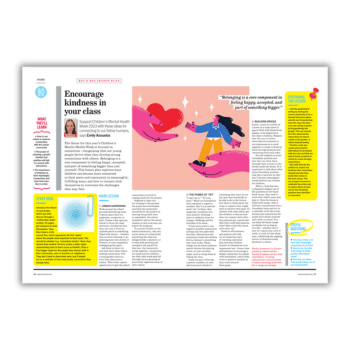Activities to teach kindness – 6 ideas

Bring out your inner Miss Honey and get your welcome face on for these activities to teach kindness…

- by Hannah Day
- Head of art, media and film at Ludlow College Visit website

If pupils feel wanted and safe then they are more likely to achieve, so try these activities to teach kindness to help children thrive in your classroom.
Morning starter activities
How can you make the start of the day less hurried, calmer and with space to welcome your students?
Make sure there is an activity that children can dip into independently, giving you time to support pupils with anything that arises first thing.
Make sure you welcome each person warmly, using their name. Ask them how they are.
It sounds so simple but since I have been making time to ensure I say hello personally to each of my children, I have found the days start off with a positive energy and, I hope, a feeling that I am pleased to see everyone.
Show and tell
We all have our favourite pet topic, and so do children.
Show and tell is a classic because it works so well at teaching young people that their interests have value.
Do you have a space each week for this? Make sure it is not the last few minutes of the day, but a proper section of time that is given over to the children.
Benefits include knowing their interests are important, becoming comfortable in sharing with a group, learning about and listening to others, and building friendships.
Building resilience in children
Children can become despondent quickly, and often it is because they expect to be able to do their work without frustration or failure.
However, if pupils understand that finding work hard is a sign of building new skills and challenging themselves, then they are more likely to meet the emotions of frustration and failure as part of the process, not a sign that they are no good.
Encourage talents
As well as reassuring them that not everything comes easily, be sure to highlight pupils’ natural talents.
It may be obvious, but don’t forget to recognise when they are helpful or inventive, kind or funny.
The key is to be explicit. Research suggests we need five positives to overcome a negative, so regular comments such as ‘I am so pleased when you….’ or ‘what I love about you is…’ help students to trust you.
Trending
This means that when you do have to give feedback that involves criticism, they have a positive relationship with you and so can take the comments constructively.
Feelings chart
A weekly check-in for students can be a quick and effective way to highlight and resolve any difficulties as they arise.
A simple sheet, used at the same time each week, where children can circle a face showing a feeling, and write down anything they would like the teacher to know, allows you to capture a regular emotional record.
Of course, you must review and act on anything that comes up, but rather than creating more work it can be an effective way of stopping problems before they have time to take hold.
Additionally, keep the sheets as records so you can check for patterns which may be helpful.
Building trust with parents
Sometimes it can be frustrating or difficult to work with parents. Other times it’s easy.
But either way, we need to trust them. They love and know their children, and if something is bothering them or the child, we must work with them.
There is often a sense of ‘them and us’ between teacher and caregiver, but remember we are on the same team.
Check how you feel when you get negative feedback from parents. What does it bring up for you? Are you open or hurt? Do you feel judged or angry?
If it’s a negative response and you can work out why you react that way, you can work on it, and so be more able to work with parents in the future, through open, welcomed dialogue. Activities to teach kindness aren’t just for the kids!
Hannah Day specialises in creative education and is based in the West Midlands.










